International Webinar “The Future of Education in the Post-COVID-19 Era in China and Central Eastern Europe Countries" was successfully held
date:2020-12-05 19:33author:小编source:Smart Learning Instituteviews:
Since the establishment of the "17 + 1" cooperation mechanism, exchanges between China and Central and Eastern European countries (CEECs) have increased day by day, and a series of fruitful results have been achieved in the field of education. With the constant repetition of the epidemics, the application of information technology in education is becoming more and more extensive. Many countries have launched various large-scale online education practices, and many practical and innovative achievements have emerged. How to learn from these practical results, discover the possibilities and challenges of the development of education informatization, and prepare for future education is worth pondering by educators from all over the world.
On December 3, 2020, an international webinar entitled ” The Future of Education in the Post-COVID-19 Era in China and Central Eastern Europe Countries”, initiated by Smart Learning Institute of Beijing Normal University(SLIBNU) was held. More than ten experts in the field from China and CEECs were invited to discuss the current status of education informatization in their countries, share practical experience during the epidemic, and look forward to the new direction of education informatization in the post-epidemic era.
On December 3, 2020, an international webinar entitled ” The Future of Education in the Post-COVID-19 Era in China and Central Eastern Europe Countries”, initiated by Smart Learning Institute of Beijing Normal University(SLIBNU) was held. More than ten experts in the field from China and CEECs were invited to discuss the current status of education informatization in their countries, share practical experience during the epidemic, and look forward to the new direction of education informatization in the post-epidemic era.

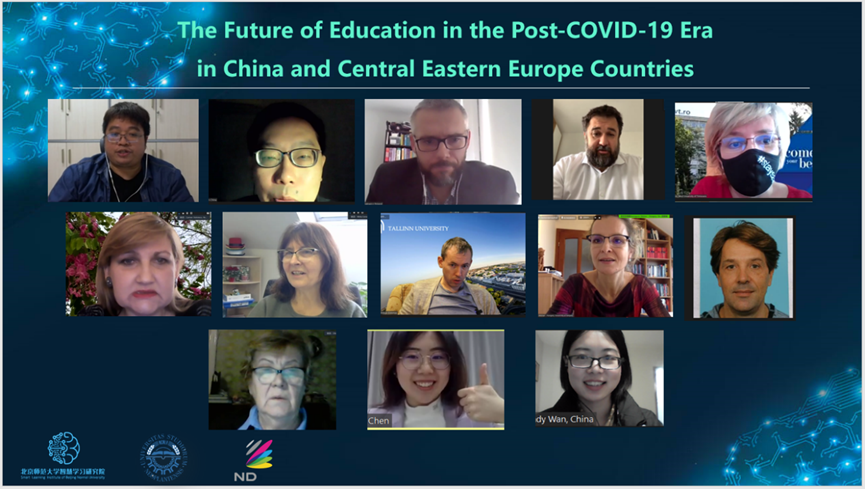
During the webinar, Dr. Tingwen Chang, assistant to the dean of SLIBNU, introduced the Joint Virtual Laboratory for Future Education (LabFE), which was jointly established by Beijing Normal University, Novi Sad University in Serbia, and NetDragon. He expressed his gratitude to LabFE experts who participated in the research work related to a series of educational informatization instruction manuals realized by SLI, and shared the important achievements of LabFE, Comparative Analysis of ICT in Education between China and Central and Eastern European Countries, which was co-written by experts from 17 countries, describes in detail the development of education informatization in each country. Dr. Tingwen Chang hope that more experts from different countries can join in the LabFE to jointly build a trans-international research community.
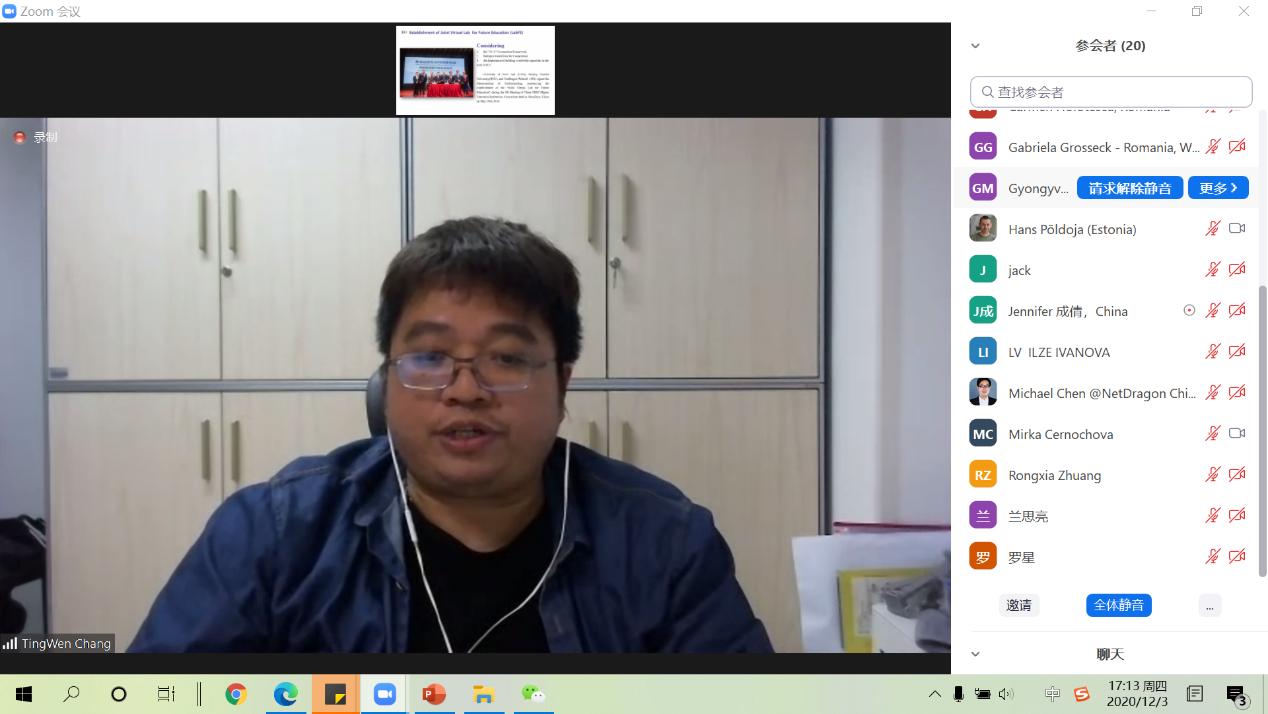
Mr. Chen Hao, Director of Business Development of NetDragon, based on the industry-university integration background of SLI and LabFE, introduced the history and commercial output of NetDragon, as well as the digital learning projects the company has carried out around the world in recent years. He highlighted the smart education project that LabFE conduct at Serbia, and proposed an initiative, hoping to develop more in-depth cooperation with universities in CEECs to jointly promote the future process of education informatization.

Subsequently, experts from 8 Central and Eastern European countries shared their knowledge and experience, introduced various measures taken by each country during the epidemic, and also analyzed the application prospects and directions of information technology in future education.
Professor Bartlomiej Michalowicz from University of Warsaw in Poland gave a comprehensive introduction to the impact of the epidemic on school teaching. He pointed that even though the epidemic has made distance learning the norm, it has also highlighted the need for improvement in skills, teaching and learning, and psychology for teachers and students. Schools are committed to providing students with high-quality online learning resources to achieve asynchronous learning, but lacks attention to the establishment of a learning management system. More and more public service resources are available online, but there are still problems that cannot be ignored in infrastructure, network connections, equipment and space required for remote work or study. In Poland, MOOCs are mostly used for interest-based knowledge acquisition. How this form can be promoted in the field of higher education is a question worth exploring.
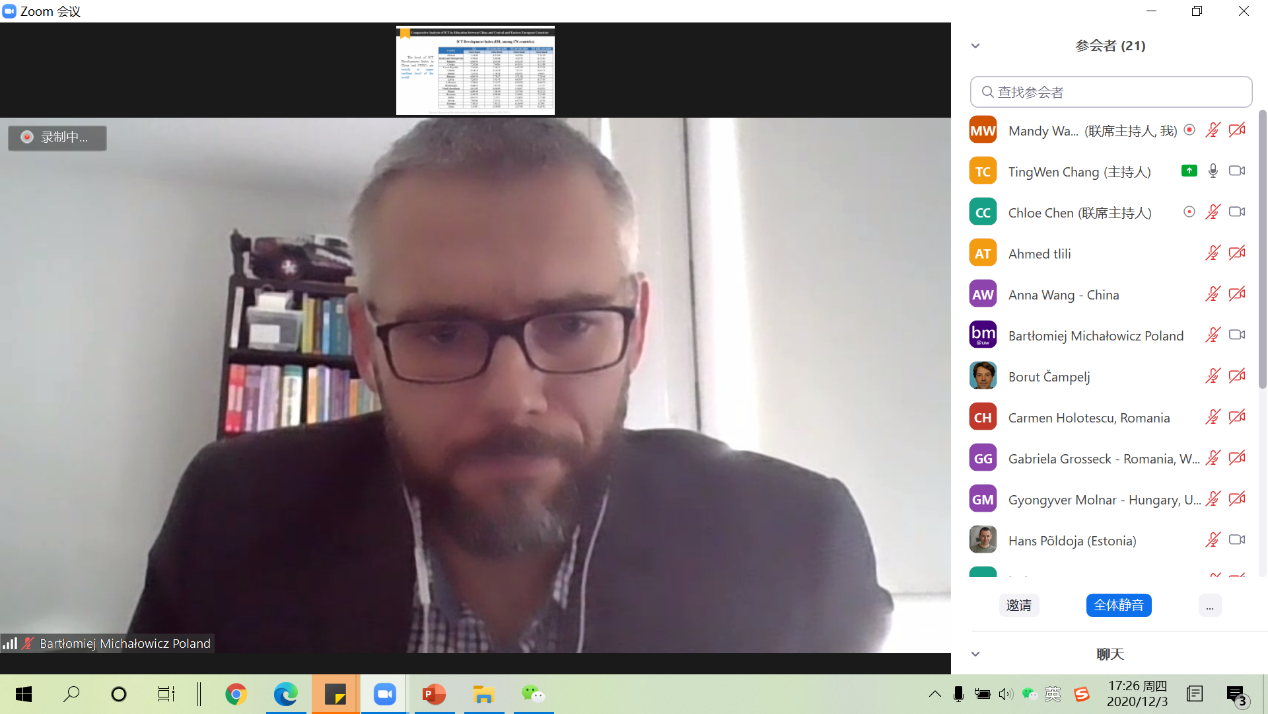
Prof. Bojan Lalic from University of Novi Sad in Serbia focused on the establishment and development of LabFE and was full of expectations for the future of the 17+1 cooperation mechanism. He invited scholars to join the EMS (European Manufacturing Survey) experimental project. Based on China's experience, analyzing learning data under the epidemic may be able to construct a roadmap for the development of future online education capabilities. He proposed that LabFE can lead this project, and believe this kind of cross-space cooperation has greater potential in the future.
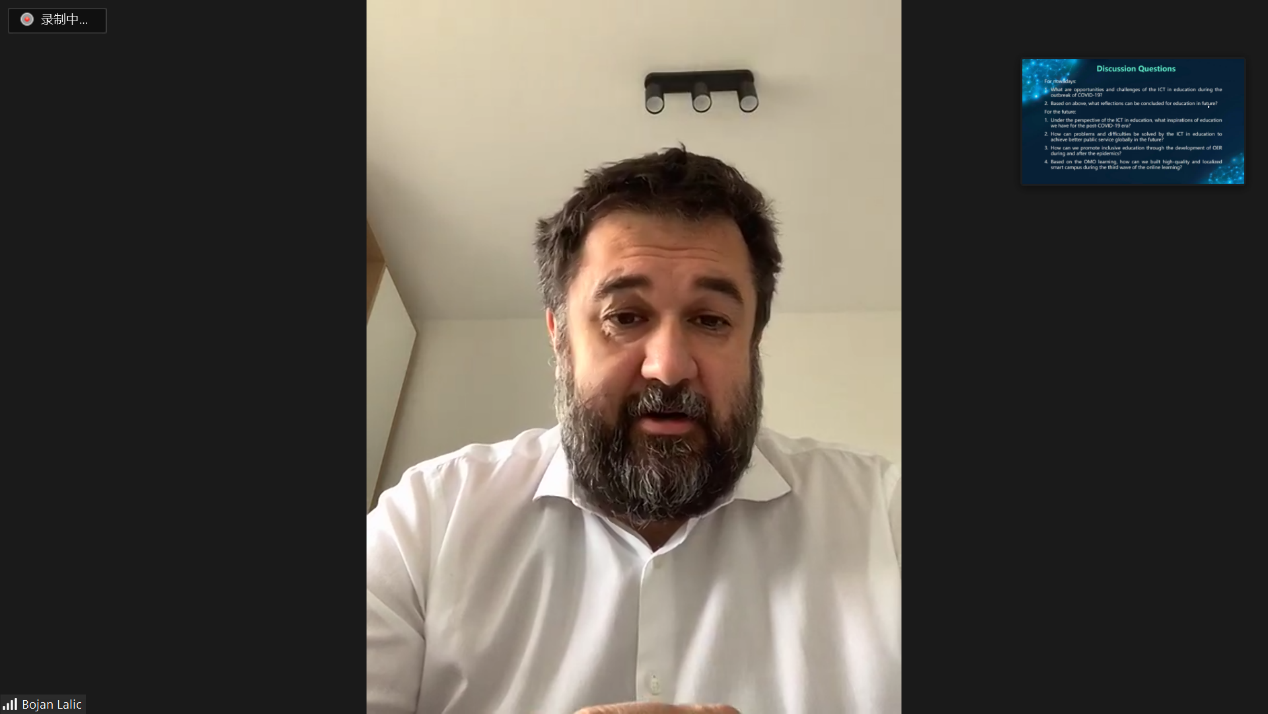
Prof.Gabriela Grosseck of Loan Slavici University and Associate Professor Carmen Holotescu from Western University of Timisoara in Romania talked about the challenges Romania faces under the epidemic and the countermeasures in the post-epidemic era. They believe that the epidemic has not only promoted the use of information technology, but also reshaped the future of education. Currently, Romania has launched the Smart-Edu strategy for the period 2021-2027, focusing on accessibility, connectivity, community, digital education ecosystem, innovation and sustainability, and cultivating students and teachers’ problem-solving skills and strong adaptability.
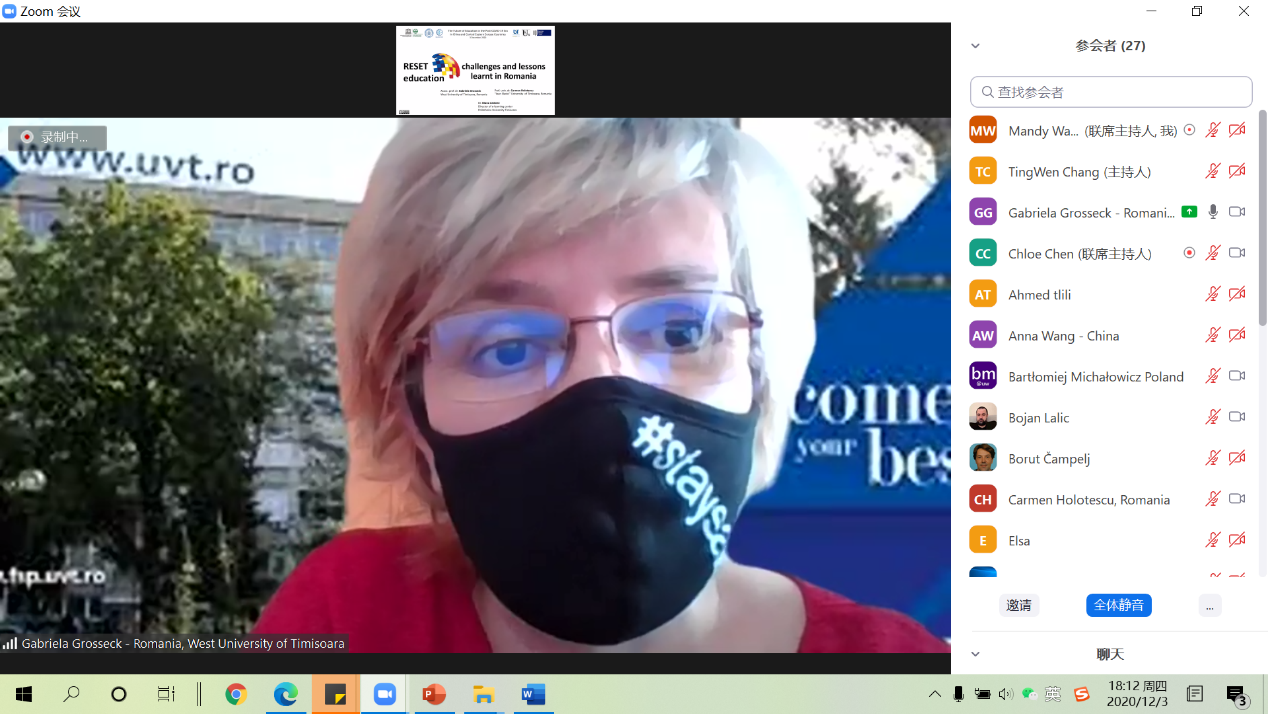

Dr. Borut Čampelj, researcher of the Ministry of Education, Science and Sports of Slovenia, shared the digital education action plan of the Republic of Slovenia for 2021-2027. The plan will be officially released in January 2021. It mainly focuses on six priorities: National hub and center for digital education; Didactics of digital education ; Renew of curricula, study programs and jobs; Education and training of educators; Supporting ecosystem for digital education, and Protocols for education in special circumstances.
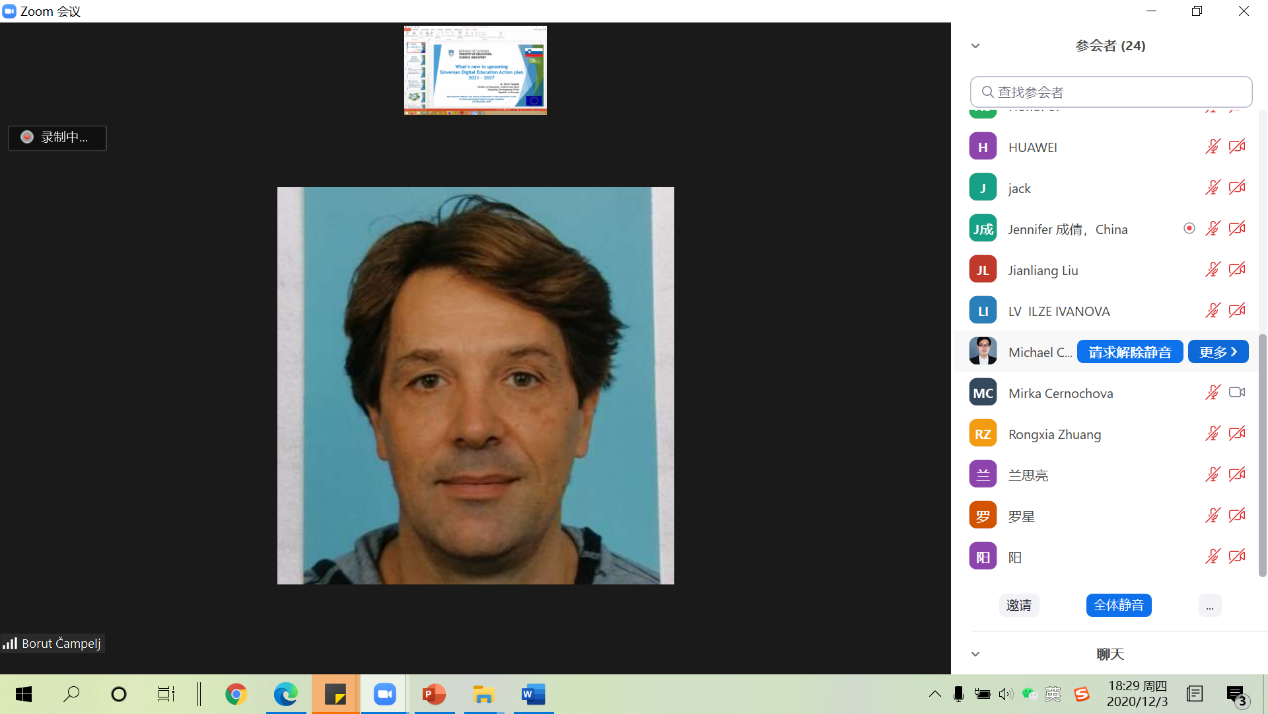
Professor Miroslava Černochová from Charles University in the Czech Republic stated that although schools and teachers have received various forms of help, it is still very difficult to develop courses in specific subjects such as music and sports under the epidemic. In addition, distance education is also a great challenge for students in lower grades. She believes digital technology must be integrated into daily teaching in the future and more open educational resources must be developed. Schools need more newly designed courses, especially basic courses related to information and communication technology. Teachers should also get more support in this regard.

Professor Hans Põldoja of Tallinn University in Estonia believes that the biggest challenge for teachers is to redesign curriculum activities, especially practical and hands-on courses, to adapt them to blended learning or a completely online teaching model. For students, maintaining self-discipline and mastering learning skills are also challenges brought about by the epidemic. Looking forward to education in the post-epidemic period, he believes that blended learning will become the new normal of education. The limitations of the school site as a place of learning will be reduced, and the change of teaching and learning methods will make more open-source curriculum resources needed than the traditional open-source curriculum management systems (Moodle).
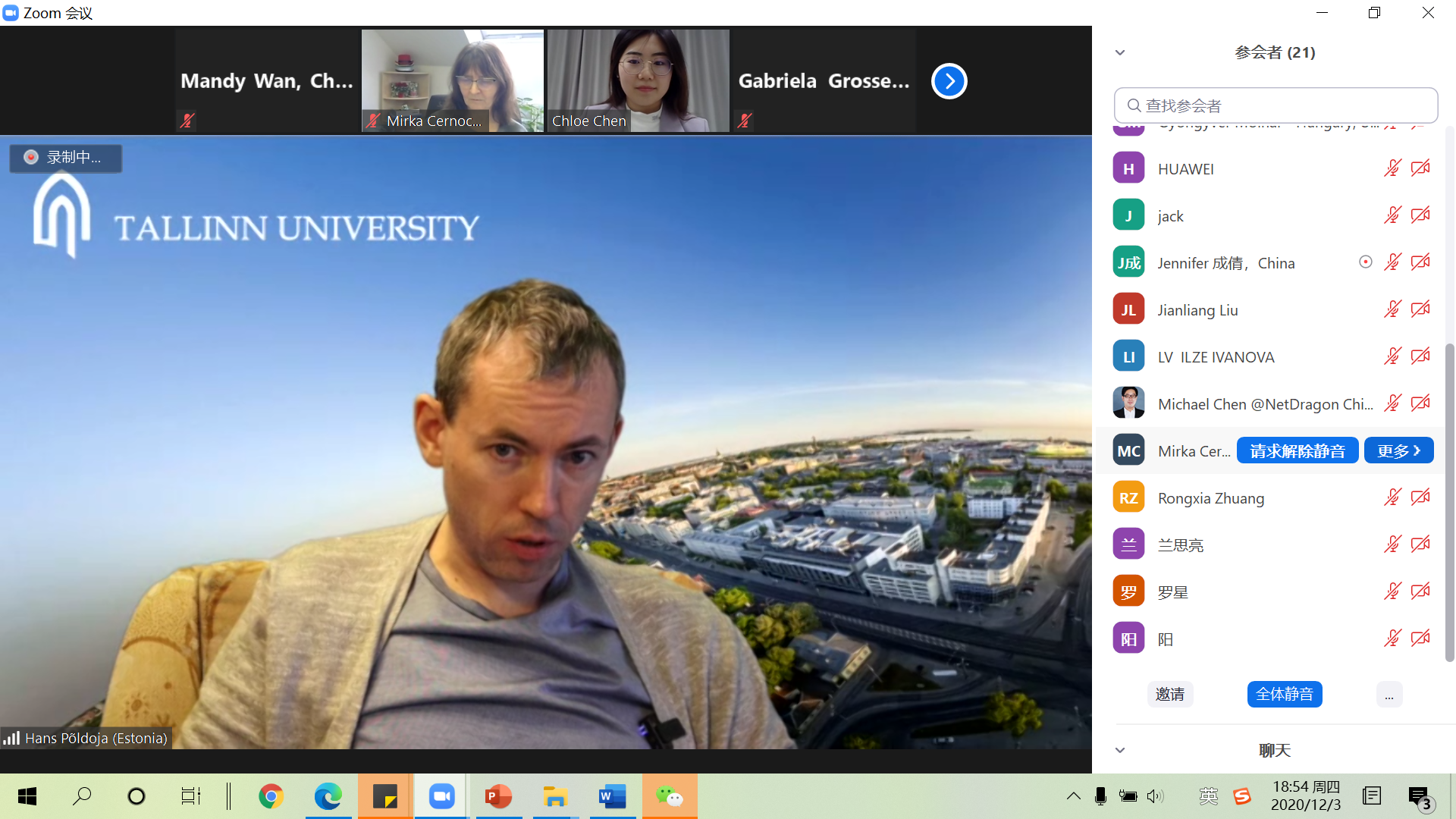
Professor Gyöngyvér Molnár from the University of Szeged in Hungary believes that the epidemic will trigger school changes and a potential educational revolution may begin. The potential of digital tools has been given more attention, and the need for personalized education has become clearer. Facing this digital challenge, from a measurement perspective, many online resources have been developed to help students prepare for admission.

Professor Ilze Ivanova of the University of Latvia believes that following the trend of distance education that emerged in the last century, the epidemic has made people use new technologies more frequently. Digital education is no longer a separate element in education, teachers, students, families and even corporate employers need to update their ideas. Starting from the three aspects of people, technology and service, she elaborated on how to create a more comprehensive learning system through a triangle model.

Dr. Tingwen Chang briefly summarized the webinar and released LabFE's next action plan---the development of the "China-CEECs Smart Education White Paper". This white paper will mainly analyze the situation of smart education in each country, the implementation of education informatization, the reform of education and teaching methods and implementation cases in various countries during and after the epidemic, and will provide a good reference for the future development of education. At the same time, He hopes authors from CEEC countries can actively join in to provide help for more students, teachers and other stakeholders.

